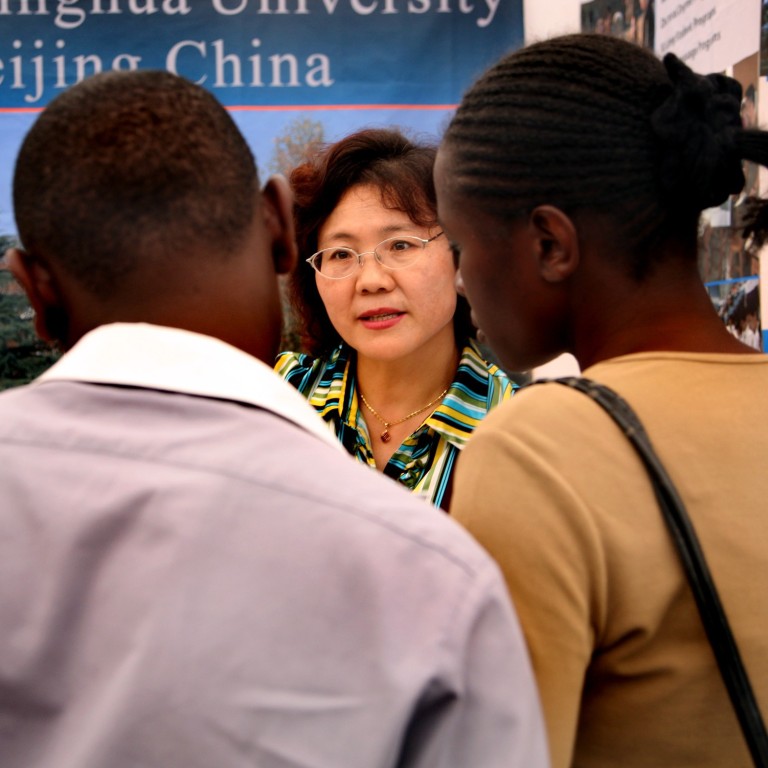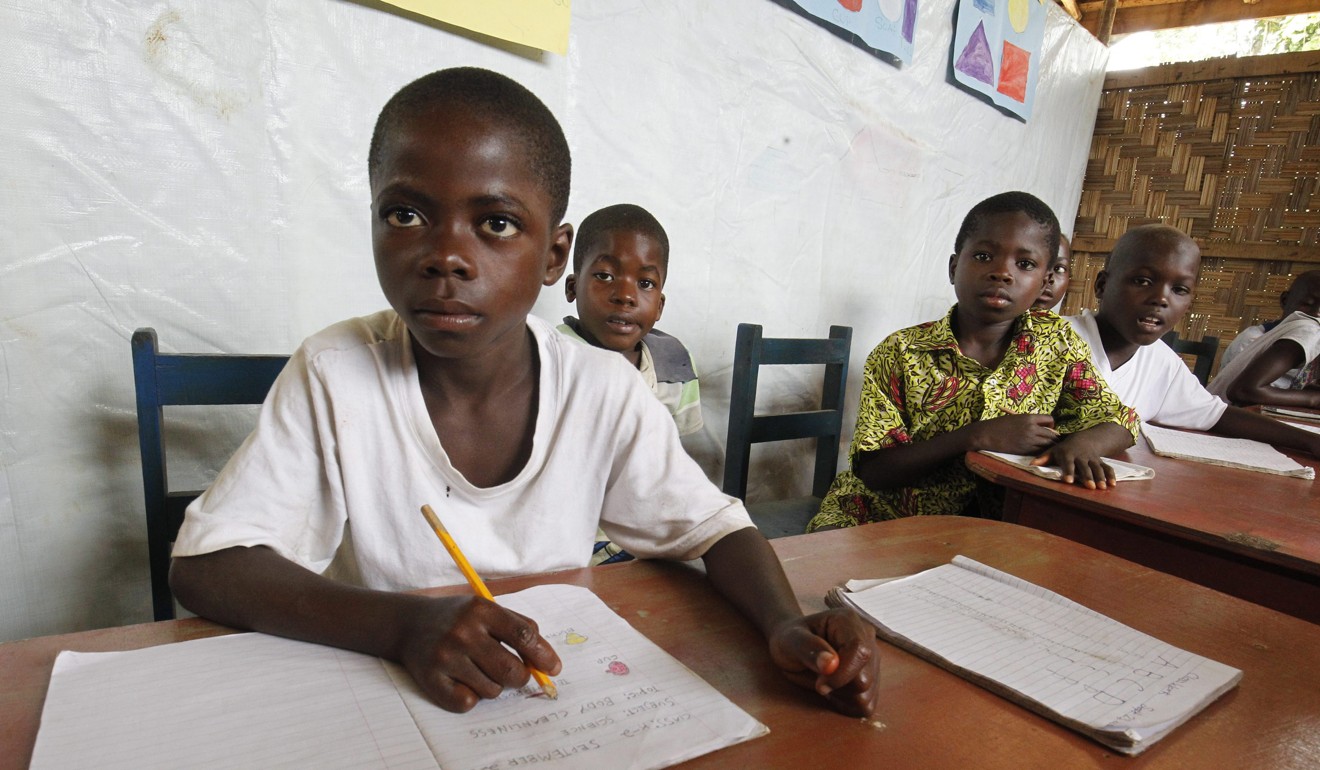
Scholarship offers driving China’s soft-power play in Africa
- Initiative that sends thousands of African students to Chinese universities builds an army of influencers for Beijing on the continent
- Boosts China’s image in Africa, where it is a dominant investor and trading partner, while countering accusations of unscrupulous practices
Since the late 1990s, Beijing has chalked up a broad list of successes in Africa, driven by a “going global” strategy that encourages domestic enterprises to invest more abroad.
Under that plan of action, China in 2009 toppled the United States to become Africa’s biggest trading partner.
Beijing also is now the biggest bilateral lender to most African countries; over the past two decades it has financed about US$143 billion worth of infrastructure projects, including ports, railways, airports, motorways, roads and hydropower dams, according to data compiled by the China-Africa Research Initiative at the Johns Hopkins University School of Advanced International Studies in Washington.
But Beijing’s image has taken a beating in the process.
It faces growing criticism that it is burdening African countries with debt through its Belt and Road Initiative, a multibillion-dollar plan to link China with Europe and Africa through investment in infrastructure.
To some critics, Beijing is in Africa to colonise countries. They accuse Chinese companies of shipping in workers to take on jobs that local workers could handle. They also object to China’s alleged dumping of cheap products on the continent.
These claims may not be entirely true; but the perception still runs deep that China has been conducting unethical or unscrupulous practices in Africa.
China, well aware of these accusations, is determined to fix its image on the continent through a mix of initiatives, including the establishing of dozens of Confucius Institutes.
At last year’s Forum on China-Africa Cooperation in Beijing, President Xi Jinping promised to award 50,000 scholarships and 50,000 training opportunities to Africans in the next three years – 66 per cent more than were awarded in 2015.
These Beijing-funded institutes – based at colleges and universities – teach Chinese language and culture and have been likened to France’s Alliance Française and England’s British Council.
Beijing also has expanded its influence in Africa through state media outlets such as Xinhua News Agency, which is building a 16-storey office and residential tower in Nairobi to house its African operations, and CGTN Africa, the African bureau of Chinese Global Television Network, the English-language news channel run by Chinese state broadcaster China Central Television.
In addition, state-run China Daily, the country’s largest English-language newspaper, publishes a weekly Africa edition promoting Chinese interests on the continent. The paper’s overall mission, critics say, is to counter China’s negative reputation in parts of the world.
China to keep up Africa infrastructure loans despite debt-trap claims
The most influential of these soft-power initiatives in Africa is perhaps a Chinese scholarship programme that sends thousands of African students to China for both undergraduate and postgraduate studies.
At last year’s Forum on China-Africa Cooperation in Beijing, Chinese President Xi Jinping promised to award 50,000 scholarships and 50,000 training opportunities to Africans over the next three years – 66 per cent more than were awarded in 2015.
This number dwarfs scholarship programmes for African countries by other countries including Britain and the United States.
Through scholarships, Beijing is building an army of future influencers for its activities on the continent. When these students complete their studies, they will be expected to sell China positively, not only in Africa but globally.
Their awards cover tuition fees and medical costs and even include a living allowance, according to details released by Chinese embassies in Africa.
Chasing China, Japan looks to Africa for trade and global influence
Analysts say the huge scholarship programme creates both goodwill and ambassadors for China-Africa relations on the continent.
“It has generally been successful in terms of goodwill created,” said David Shinn, a diplomat and professor of International Affairs at George Washington University’s Elliott School of International Affairs in Washington.
But it was questionable, he said, whether China was getting the best African students with its initiative. “I suspect the best students are still attending Western universities, but there is no way to prove this one way or the other,” he said.
Since late August, thousands of new students from Africa have begun studying at various Chinese universities. Chinese officials say the number of African students studying at higher education institutions in China this year is the highest ever.
For instance, compared with a year ago, Beijing has more than doubled to 259 the number of scholarships offered Tanzanian students and nearly doubled to 400 the number of Ethiopians admitted to long-term degree programmes, according to Chinese embassies in those countries.
Scholarships to study in China also were awarded to 56 South African students, according to Chinese ambassador to South Africa Lin Songtian, and to 310 Ghanaians. Other China scholarship winners came from Botswana (52), Uganda (99), Egypt (364) and Cameroon (128).
University of Nairobi School of Business associate professor XN Iraki said the high number of scholarships for African students reflected China’s growing ability to persuade others to do what it wanted without force or coercion – the measure of its soft power.
China must allay any debt-trap fears in its dealings with Africa
“It’s soft power, reaching to the next generation,” Iraki said. “The US did that before independence with the airlift.”
He was referring to the 1960 awarding of US scholarships to 800 African students in a programme partly arranged by then-US presidential candidate John F. Kennedy and African independence activist Tom Mboya.
The move was later said to have boosted the Massachusetts senator’s popularity with African Americans en route to the presidency.
“China wants to prepare the next generation of consumers and influencers,” Iraki said, terming the move as an investment in emotional sustainability for Beijing by ensuring its brand reaches the next generation.
Early this month, the Chinese embassy in Nairobi organised a farewell party for 182 scholarship winners.
Zhao Xiyuan, the minister counsellor of the Chinese embassy to Kenya, said at the event: “Both countries hope the young Kenyan students who are about to study in China will study hard to learn new knowledge, make new friends, and make a positive contribution to the cooperation and friendship between China and Kenya.”
Ababu Namwamba, Kenya’s foreign affairs chief administrative secretary, said China’s education system had much to teach the African country.
How Africa became a test lab for China’s approach to global peacekeeping
“Kenya is at a point where we have a lot to learn from China. This is a country that has demonstrated that it is possible to beat poverty,” Namwamba said. More than 1,000 Kenyans have benefited from Chinese schools’ scholarships.
Some students said that besides taking courses they would use the opportunity to study in China to learn about new technologies, language and culture.
“I’m eager to go and learn their technologies because ICT [information and communication technology] in China is advanced compared to Kenya’s,” said Charles Kiragu, who was admitted to an ICT engineering programme at a university in central China’s Hubei province.

Samuel Macharia, who heads the Kenyan Students Association in Beijing, cautioned students to be mindful of the risks of studying in China’s new and unfamiliar culture. If they broke Chinese laws, they would risk being deported.
“You must do what is right at all times,” said Macharia, a PhD student at the University of Science and Technology in the capital.
In Zambia, Chinese officials said they expected students who completed their studies in China to integrate their learning with the development of China-Zambia relations.
China wants private investors to unlock Africa’s potential
Chinese Ambassador to Zambia Li Jie told a recent event for Zambian scholarship winners that China willingly embraced the opportunity to implement the outcome of the Forum on China-Africa Cooperation “to train more outstanding talents for Zambia and help Zambia achieve its seventh national development plan”.
Education specialists say that while the US remains home to the world’s best universities and still has the power to attract top students, China’s greatly improved education system is increasingly attracting students from Asia and Africa who will make up the next generation of leaders.
The number of students globally joining Chinese universities surged sixfold in the 15 years to 2018, rising from 77,715 in 2003 to 492,185 last year, according to the Chinese Ministry of Education.
Over the same period, the number of African students in Chinese higher-education institutions increased an astounding fortyfold, jumping from about 1,793 in 2003 to 81,562, last year, according to the Chinese education ministry’s statistics.
With that increase, Africa had the most students in China of any region after Asia, which sent 295,043 students to Chinese universities last year.
The right way for China to invest in a new hi-tech Africa
The US has continued to enjoy strong educational ties with African countries since the 1960s and the airlifts that paid for hundreds of African scholarship winners’ air travel to American universities.
The airlifts brought more than 750 East Africans, including former US president Barack Obama’s father, to US schools. Some would return to Africa to take up leadership positions; others would form the workforce for American companies that set up shop on the continent.

Professor Bitange Ndemo of the University of Nairobi, a former permanent secretary in Kenya’s Ministry of Information, Communications and Technology, said such scholarship offers were designed to develop influencers who would shape the agenda of the awarding country.
“At some point, Britain and the US, who awarded the early scholarships of an independent Kenya, had an overwhelming influence in Kenya with their awardees occupying virtually every office in the country,” said Ndemo, who studied in the US at the University of Minnesota and in Britain at the University of Sheffield.
“The outcome from the UK and US was that the two countries were the largest trading partners, with the balance of trade always favouring them.”
The everyday headache for China’s belt and road firms: labour relations
But in the last decade, China has sold itself as the favourite destination for international students, through providing scholarships.
Li Anshan, who directs Peking University’s Institute of Afro-Asian Studies, Centre for African Studies and school of international studies, said in a paper last year that growth in the number of African students in China began rising with the first summit of the Forum on China-Africa Cooperation in 2000.
At the end of 2002, there were 1,600 Africans among the 85,800 foreign students in China, he wrote. By 2009, the number had jumped to 12,436 out of a foreign student population of 230,000.
China may also be benefiting from tougher American restrictions on student visas that make it harder for international students, including those from China, to enter the US for study.
As the escalating trade war between Beijing and Washington raises American worries about spying and technology theft, the visa restrictions hit Chinese students seeking to study engineering and manufacturing especially hard.
Why China has nothing to fear from America’s Africa strategy
China’s Ministry of Education warned in June that Chinese students planning to study in the US could face difficulty obtaining visas amid the deterioration in US-China relations.
As Beijing intensifies its education diplomacy in Africa, the Fulbright US student programme, which has awarded scholarships over the years to international students, this year is facing budget cuts.
Fulbright scholarship recipients often return to become influencers in their home countries after completing their US programme.

